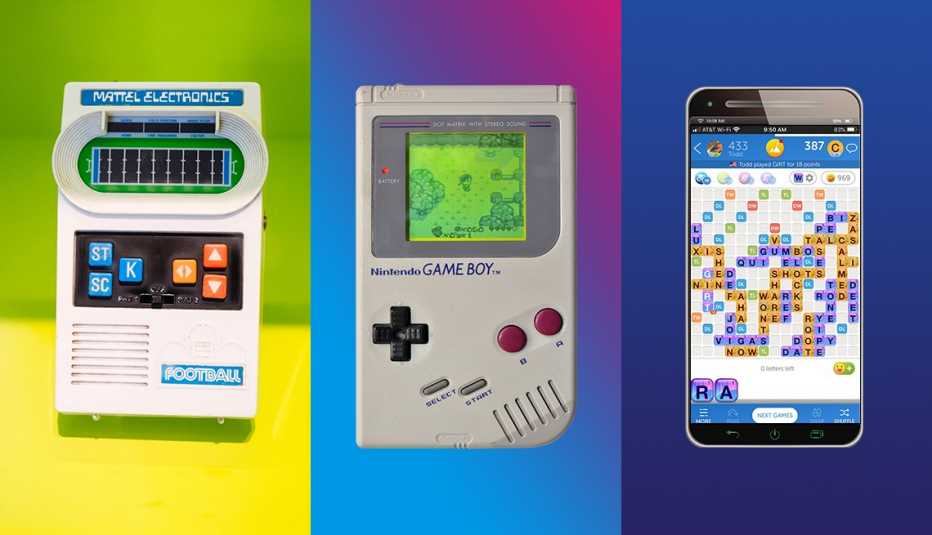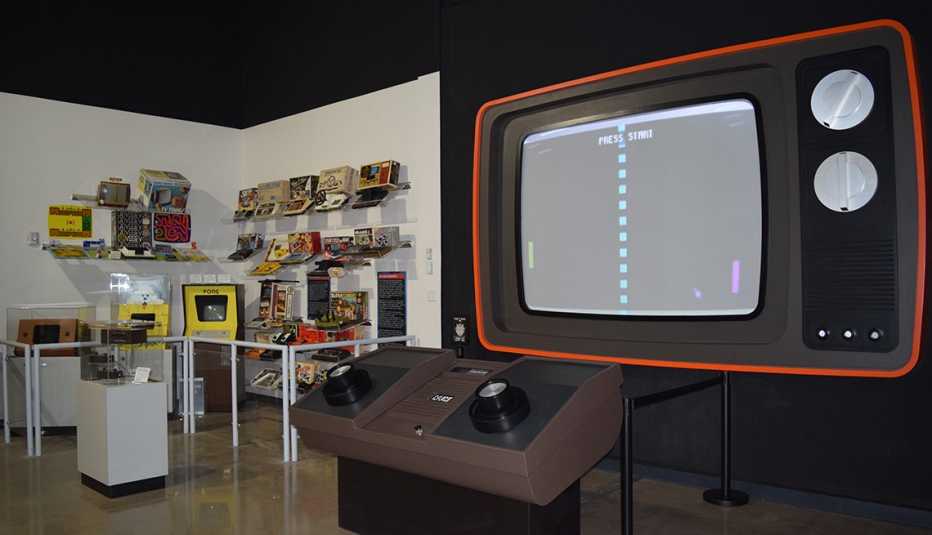
What draws nearly half of all older Americans — and an even larger percentage of those younger than us — to play so many games on a phone, computer or console hooked up to a TV? What makes digital gaming so appealing that it becomes both a daily and a lifelong pursuit, including for a 50-something like me who's been playing since his arcade days in the 1980s?
Right now, over 5 million people are playing Fortnite. Last month, nearly 240 million people played Candy Crush. Last year, 31 million of us paid $50+ for a new version of Animal Crossing.


Video games have evolved over time, and have become more interactive with improved visual displays. (Left Mattel Electronics Football; Middle: Nintendo's Gameboy; Right: Words With Friends on a smartphone).
Alamy / Getty / Zynga
The easy answer is that it's a temporary escape from the pressures of the real world — an essential distraction, particularly over this past year. And yes, lots of online games qualify as wonderful diversions: Countless Americans pass some time each day playing sudoku, Candy Crush, Angry Birds and other puzzle games on their phones or tablets.


But that's just one segment of the gaming market. Step beyond the fast-gratification phone games, and you emerge into a world where the player is more than ever an active participant in a game's narrative. Your decisions and actions impact where the story goes, as opposed to watching a film or TV, during which you're a passive couch potato.


A good game lets you not only depart your reality but also create a new one. You're not restricted by your age, height, gender or physical disabilities. Maybe you can't sink a free throw in real life, but in a game of NBA 2K21, you can go one-on-one with Michael Jordan — and beat him. Players gain competency as they dive in, taking pride in cracking a hard puzzle or ascending to a new challenge level. I will forever treasure the look of immense pride on the face of my 13-year-old daughter, Alyssa, as she whooped it up after getting her first victory in the action game Fortnite.


To understand gaming, forget the technology and focus on the humanity. It's in our nature to join the fray, to learn the rules and master the system, to build things (and for some of us, to blow them up), to gain and lose, to chill out and chalk up -— and even brag about our scores — to spin entire worlds from only our imaginations. And like me and my daughter, we also like to win.
No surprise that the tensions of the pandemic brought more people into the gaming fold. A survey by Deloitte, a professional services company, found that 34 percent of those surveyed had tried a new video gaming activity in 2020. Those activities range from playing a new game to subscribing to a game service to watching someone else play in the growing phenomenon called e-sports. And industry analysts say a lot of those people are likely to remain engaged.
“I personally like competing and playing well,” says P.J. McNealy, CEO of Digital World Research. “Playing one, two or three quick death-match rounds online can be a nice little pocket of entertainment for me — and escapism from Twitter, COVID or, heck, pick a national crisis!”
'We knew interactivity was cool.’
Want to pilot a commercial aircraft, step into the boots of an action hero or just create an alternative you in an alternative world? If you still think of video games as kid stuff, the equivalent of an electronic toy, you are missing out on the most sophisticated form of entertainment available.
Yes, it used to be that video games were about clearing the screen of objects — take your pick: asteroids, dots, centipedes, alien invaders — while evading death en route to the high score. But today, many modern games create immersive experiences, with varying goals. Some play out like a movie, with you as the star. The choices you make determine how the story plays out. Still other games approach the existential, providing environments where players don't compete so much as build, explore and share.
"The creative side of you, rather than the competitive, can come out,” McNealy says. Take the Civilization series of computer games. They were launched in 1991 by Sid Meier, 67, an industry rock star whose name still graces the box. To read this Wikipedia description of Civilization is to realize how far video games have advanced from the days of a yellow puck chomping dots: “The player is tasked with leading an entire human civilization over the course of several millennia by controlling various areas such as urban development, exploration, government, trade, research, and military.”
"We always knew we had something special, that we were doing something unique that allowed the players to create their own stories, to be their own star,” Meier told me. “Our graphics weren't as good as movies. Our sound wasn't as good as records. But we had a special thing. We knew that interactivity was cool.”

Post a Comment